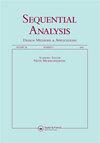对累积状态相关变化点的最快检测
IF 0.6
4区 数学
Q4 STATISTICS & PROBABILITY
Sequential Analysis-Design Methods and Applications
Pub Date : 2020-04-02
DOI:10.1080/07474946.2020.1766928
引用次数: 0
摘要
摘要基于对连续时间中状态相关最快检测问题的实际研究,特别是对于布朗观测,我们提出了一种离散时间中的渐近方案,称为累积状态相关变化点的最快检测方案。这里,状态相关意味着改变点的先验概率取决于当前状态。我们将问题简化为寻找向量值马尔可夫过程的最优停止时间。我们通过一个数值例子来说明这个方案。本文章由计算机程序翻译,如有差异,请以英文原文为准。
Quickest detection of an accumulated state-dependent change point
Abstract Motivated by the practical investigation of a state-dependent quickest detection problem in continuous time, especially for Brownian observations, we propose an asymptotic scheme in discrete time called a quickest detection scheme of an accumulated state-dependent change point. Here the state-dependent means that the priori probability of the change point depends on the current state. We reduce the problem to finding an optimal stopping time of a vector-valued Markov process. We illustrate the scheme via a numerical example.
求助全文
通过发布文献求助,成功后即可免费获取论文全文。
去求助
来源期刊

Sequential Analysis-Design Methods and Applications
STATISTICS & PROBABILITY-
CiteScore
1.40
自引率
12.50%
发文量
20
期刊介绍:
The purpose of Sequential Analysis is to contribute to theoretical and applied aspects of sequential methodologies in all areas of statistical science. Published papers highlight the development of new and important sequential approaches.
Interdisciplinary articles that emphasize the methodology of practical value to applied researchers and statistical consultants are highly encouraged. Papers that cover contemporary areas of applications including animal abundance, bioequivalence, communication science, computer simulations, data mining, directional data, disease mapping, environmental sampling, genome, imaging, microarrays, networking, parallel processing, pest management, sonar detection, spatial statistics, tracking, and engineering are deemed especially important. Of particular value are expository review articles that critically synthesize broad-based statistical issues. Papers on case-studies are also considered. All papers are refereed.
 求助内容:
求助内容: 应助结果提醒方式:
应助结果提醒方式:


